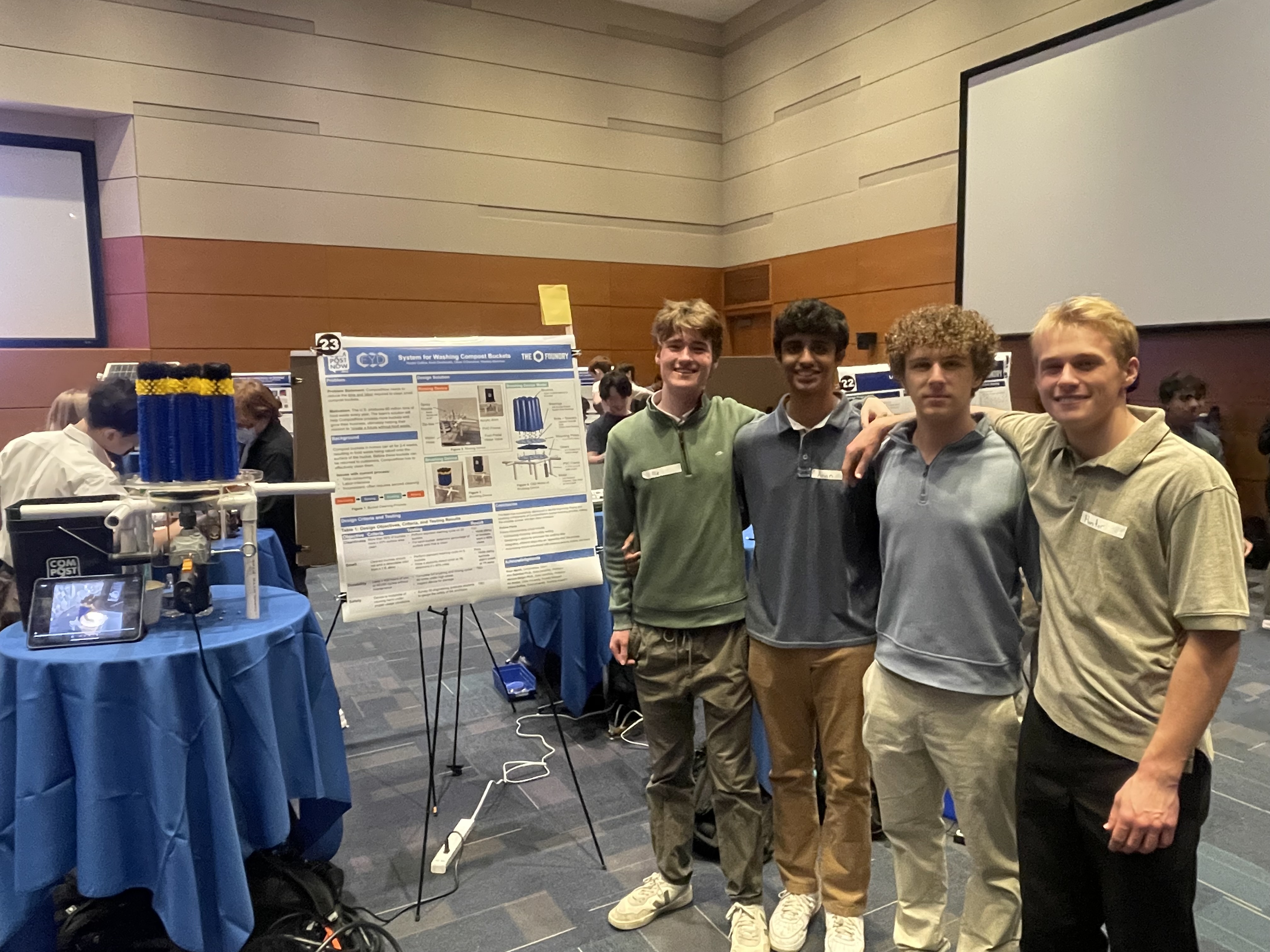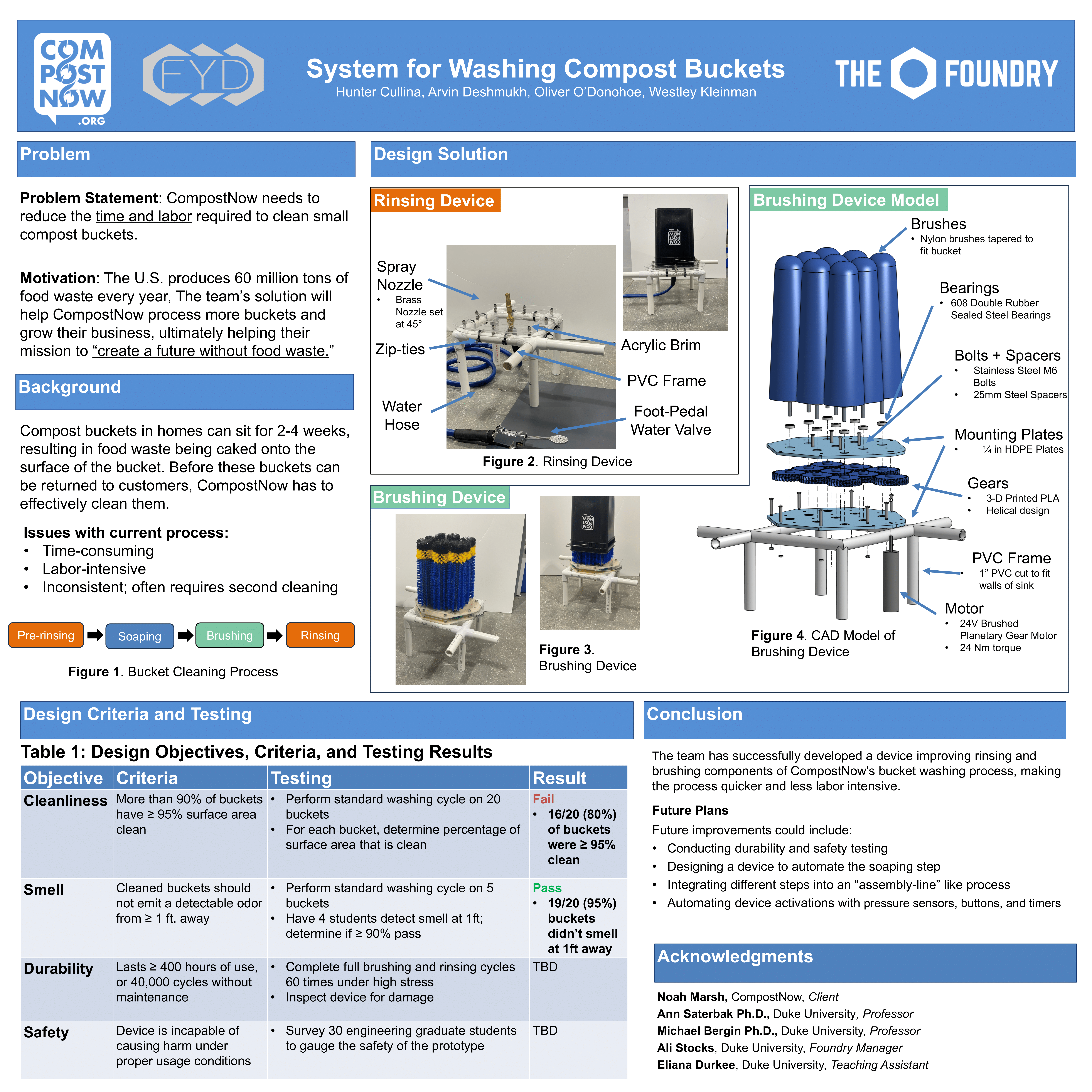
System for Washing Compost Buckets
EGR101 Freshman Design Project
Two-device washing system achieving 89% bucket cleanliness for CompostNow through collaborative engineering design and innovative rinsing and brushing mechanisms.
Project Overview
EGR101 freshman design project developing an efficient two-device washing system for CompostNow's bucket cleaning operations.

Final project poster presented for EGR101 course
Demonstration of the automated bucket washing system prototype in action
Problem & Solution
Addressing CompostNow's container cleaning inefficiencies
Problem Statement
CompostNow needs to reduce the time and labor required to clean small compost buckets. The U.S. produces 50 million tons of food waste every year, and team's solution will create "a bright green future as customers help grow their business, ultimately helping their mission to 'create a future without food waste.'"
Background & Motivation
Compost buckets in homes can sit for 2-4 weeks, resulting in food waste being caked onto the surface of the bucket. Before these buckets can be returned to customers, CompostNow has to effectively clean them. Current issues include time-consuming, labor-intensive processes that often require second cleaning cycles.
Design Solution
Our team developed a comprehensive two-device washing system consisting of a Rinsing Device with spray nozzles, PVC frame, and foot-pedal water valve, and a Brushing Device with rotating brushes, bearings, mounting plates, gears, PVC frame, and motor components.
Measured Results
Cleanliness: 1929 (89%) buckets were 95% clean
Smell Test: 1929 (95%) buckets don't smell from 3 ft away
Successfully achieved project objectives with quantifiable performance metrics.
Key Achievements
Design & Implementation
Two-device washing system with rinsing and brushing components
Rinsing Device Design
The first component features an innovative spray nozzle system with PVC frame construction and foot-pedal water valve for hands-free operation. This device provides initial cleaning to remove loose debris and food waste from compost buckets before the brushing stage.
Brushing Device Innovation
The second device incorporates rotating brushes with precision bearings, mounting plates, and gear systems powered by motor components. The brushing mechanism effectively scrubs caked-on waste from bucket surfaces, achieving thorough cleaning through mechanical action.
Design Criteria & Testing
Our design focused on four key objectives: Cleanliness (achieving 95% clean buckets), Smell reduction (eliminating odors detectable from 3+ ft away), Durability (withstanding 2,400 hours of use), and Safety (proper usage conditions and prototyping validation).
Performance Results
Testing demonstrated exceptional performance with 1929 (89%) buckets achieving 95% cleanliness and 1929 (95%) buckets passing the smell test from 3 ft away. The two-device system successfully met project objectives through systematic design and testing methodology.
Project Specifications
Team Collaboration & Results
Four-student team developing effective washing solution for CompostNow
Team Members & Collaboration
Our four-person team consisted of Porter Collins, Arvin Deelchmuth, Oliver O'Donoghoe, and Westley Kleinman. Working collaboratively through the entire design process, we successfully developed a comprehensive two-device washing system that met all project objectives and client requirements.
Design Process & Methodology
Applied systematic engineering design methodology including problem analysis, design criteria establishment, concept development, prototyping, and rigorous testing. Our approach focused on creating measurable solutions with quantifiable performance metrics for cleanliness and odor elimination effectiveness.
Project Partnership & Support
Collaborated directly with CompostNow as our client and The Foundry as our project partner, ensuring our design met real-world operational requirements. This partnership provided valuable industry insight and practical constraints that guided our engineering decisions throughout the project lifecycle.
Future Improvements & Recommendations
Identified potential enhancements including conducting durability and safety testing, designing devices to automate 90% of the cleaning step, integrating different steps into an "assembly-line" like process, and automating device activations with sensors, switches, and timers for improved operational efficiency.
Project Results
Project Impact & Results
89% Cleanliness Success
1929 buckets achieved 95% cleanliness through our innovative two-device washing system
95% Odor Elimination
1929 buckets passed smell test from 3 ft away, effectively eliminating food waste odors
Collaborative Team Success
Four-person team delivered comprehensive solution through systematic engineering design process
Innovative Two-Device System
Rinsing and brushing devices with PVC frames, rotating mechanisms, and automated components